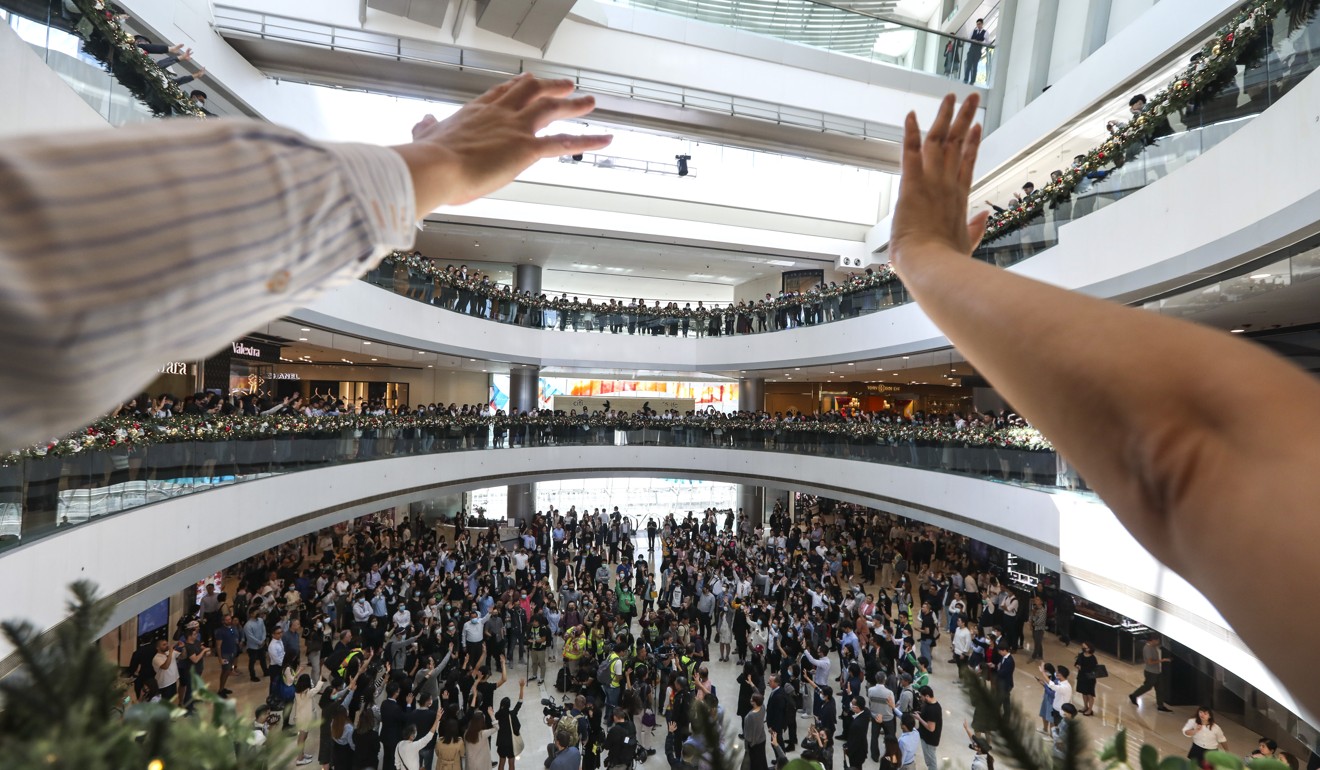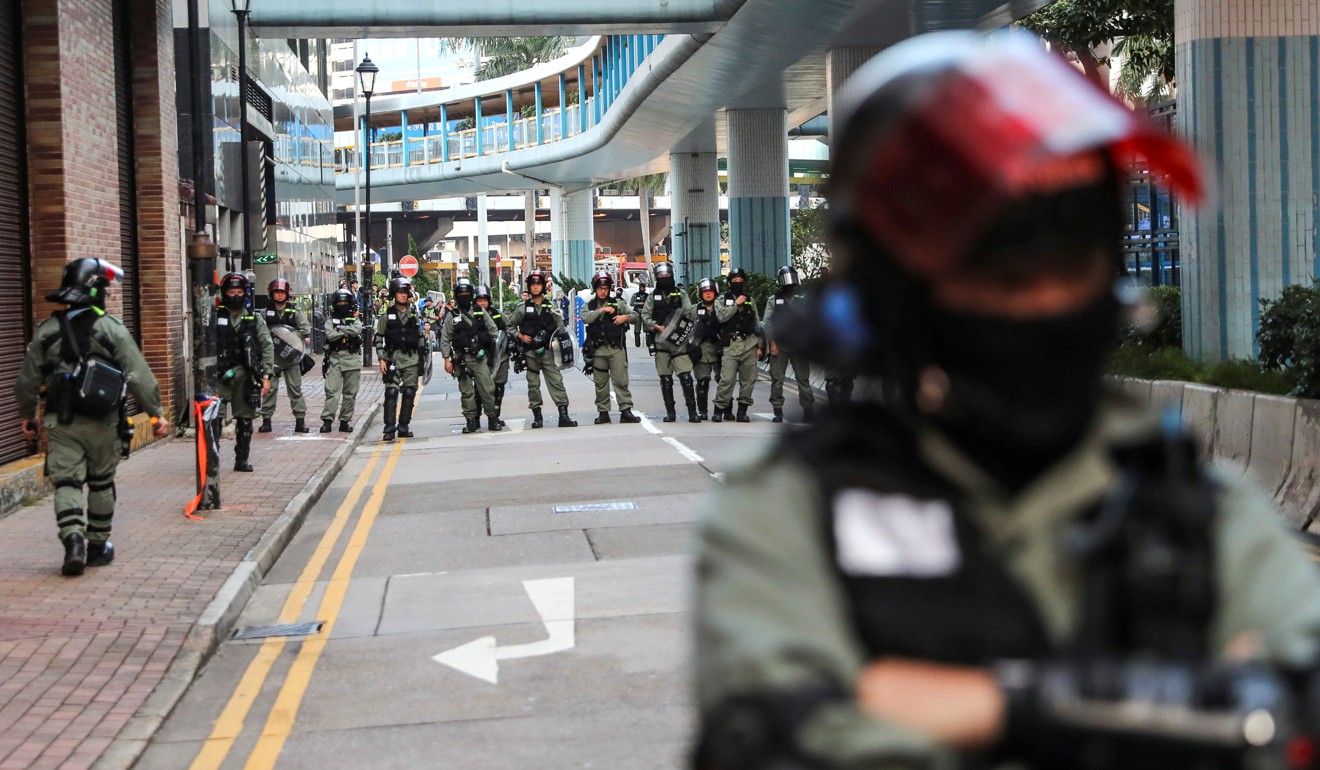
What’s next for Hong Kong protesters after the high of opposition bloc’s crushing victory at elections?
- Some believe democrats should lay groundwork for Legislative Council election next September by spreading their political ideology at district level
- Others say radicals are likely to continue to block roads and vandalise metro stations
The pro-democracy camp’s crushing victory in Hong Kong’s district council elections has left anti-government protesters pondering how to keep the momentum going until all of their five key demands are met, as they next seek to break the pro-establishment bloc’s dominance in the legislature.
Some protesters believed the democrats elected on Sunday should lay the groundwork for the Legislative Council election in September next year by spreading their political ideology at the district level. Others thought radicals would continue to block roads and vandalise metro stations, as peaceful protesters had largely not turned their backs on the movement despite recent violent clashes with police.
Wong, a teacher, believed the radicals would continue to adopt guerilla tactics, saying Hong Kong had been peaceful for the past week because protesters needed a rest.
Decisive polls outcome demands ‘drastic response’ from Carrie Lam
The pro-democracy bloc won 392 seats, up from 116 four years ago. In contrast, the pro-establishment side secured just 60 seats, down sharply from the 292 they have now.
Social media was on Monday awash with posts urging protesters not to be so overjoyed by the election victory that they forgot about their four unmet demands. The only demand the government has agreed to is the complete withdrawal of the much-hated bill.
Wong said the figures showed protesters could not be too confident about the Legco election.
Henry Wong Pak-yu, a veteran protester who unseated the Federation of Trade Unions’ Michael Luk Chung-hung in Yuen Long, also warned against being too optimistic about the Legco poll because 10 months was a long time.
“We must keep our fight going before the Legco election,” Wong said.
Asked about the direction of future protests, Wong said residents in his constituency told him they understood the more radical behaviour was the result of the government ignoring protesters’ demands. But even so, residents hoped for an end to such actions so their everyday lives would not be disrupted, he said.
Hong Kong’s crushed pro-government camp faces up to new challenges
Another newly elected councillor, registered social worker Katy Ng Yuk-ying, who has helped protesters, said the many seats the democrats had won would help them garner support for the Legco election.
A frontline protester, Cheung, 25, described the victory as a “good way out” for Hongkongers to take the matters their cared about to the authorities after almost six months of protests.
“My worry is that some of the candidates who won have no experience as councillors, and that officials may refuse to listen to them,” he said.

Cheung, who regularly takes to the protest front lines decked out in helmet, mask and insulation gloves, said he was now leaning towards using peaceful means to press the government to comply with the remaining demands.
He wanted to find out if district councils could bring protesters’ voices to the government. However, he still supported the more radical elements, saying different people had roles to play in keeping the social movement kicking.
Whether the pro-democracy bloc would win big in the next Legco election was of little interest to him because the legislature was fundamentally flawed as half of the 70 seats were not directly elected and most of those would likely go to the pro-establishment camp.
“It does not really matter how many directly elected seats the democrats manage to win next year,” he said.
At the Urban Council Centenary Garden in Tsim Sha Tsui on Monday, dozens of people gathered to show support for protesters holed up inside Polytechnic University, which has been surrounded by police since earlier this month following violent clashes between radicals and officers.

Among them was a 19-year-old PolyU student, who said he was happy with the election result as it paved the way for the democrats to win all five “super seats” in the legislature. Being a district councillor is the criteria to run for a “super seat”.
“I do think the atmosphere of protest is cooling down, as I do not see any demonstrations planned for the future,” he said.
He hoped protesters would start planning how to help democrats win more seats in the legislature because the pro-establishment bloc would be going all out to win.
To be honest, I do not want to see protest actions going to the next level. There’s a huge cost for all of us
He had no problem with more vandalism of MTR stations, saying: “The election results have proved the public saw that we resorted to violence unwillingly … I am not worried about losing public support.”
Another protester, Joseph, 26, said: “To be honest, I do not want to see protest actions going to the next level. There’s a huge cost for all of us … some were injured.”
He said lunchtime protests in Central should continue to keep the momentum going.
“Setting roadblocks and calling for a mass strike should still go on because I think the economic bargaining chip was quite successful. But, in the long run, strikes are not going to work because a lot of people have a financial burden,” he added.


